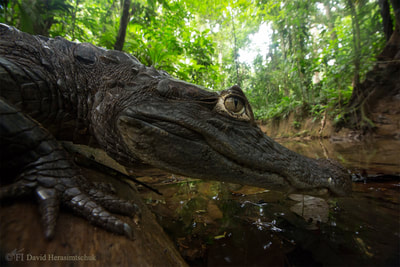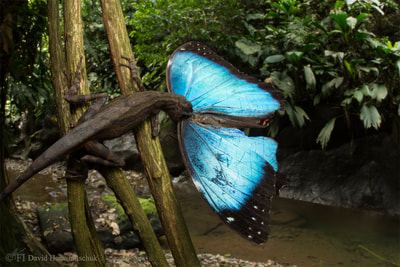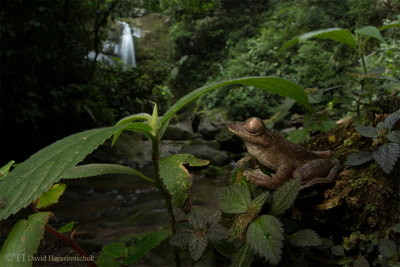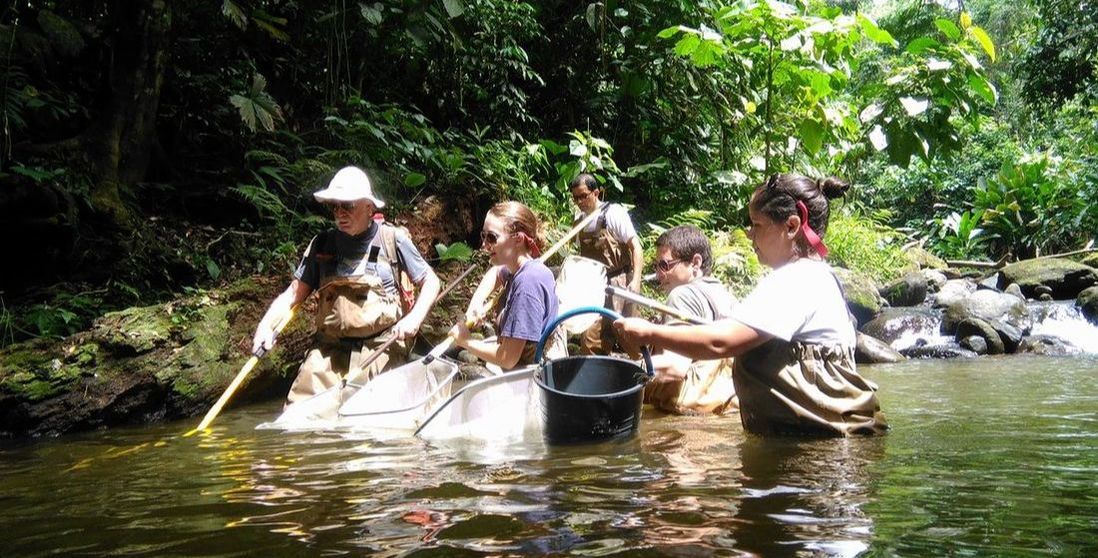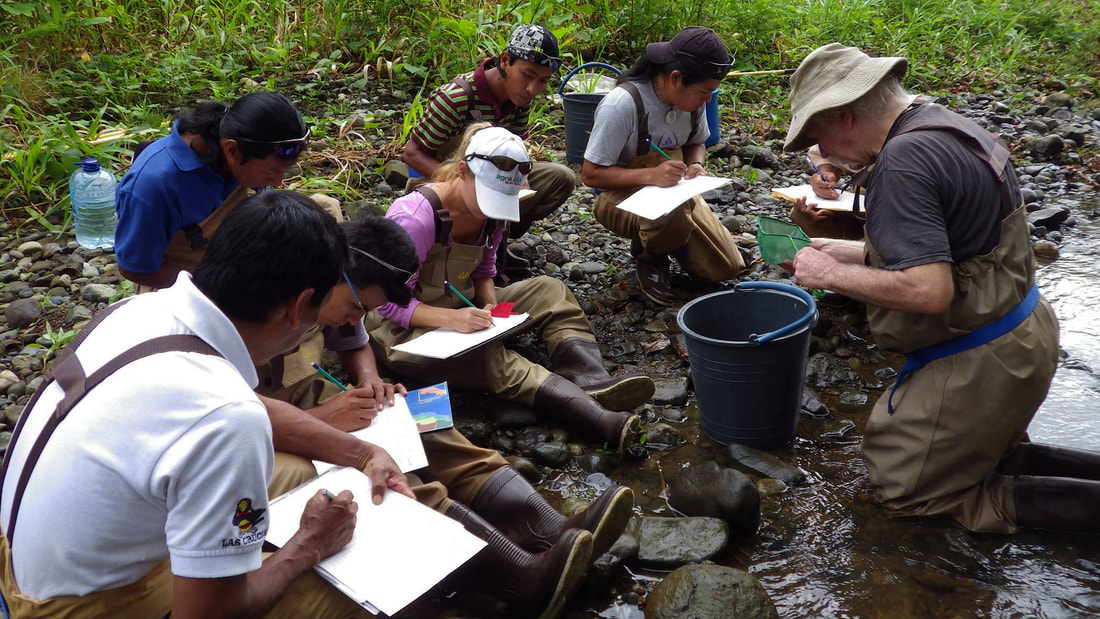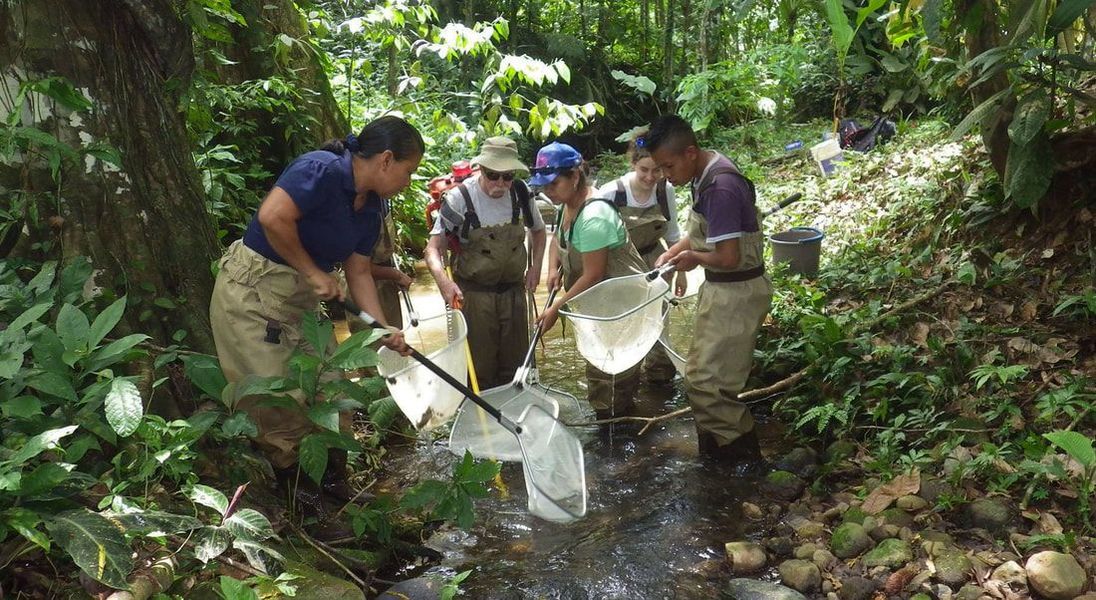|
HOW YOU CAN HELP
You can help the Stream Biomonitoring Program of ANAI in two ways, by making a tax-deductible donation of any amount to further or work, or by volunteering your time. DONATIONS The ANAI Stream Biomonitoring Program has to be one of the most cost-effective conservation programs in the world. On an annual budget of $80,000 – 100,000 we manage to do all the work described here (and more) while maintaining a staff of 3.5 (2 biologists, Maribel Mafla and Ana Maria Arias at full time and director Dr. Bill McLarney at half time, plus resident station manager, security guard, and when needed willing field helper Jairo Castillo), not counting bioeducators, who are paid as day laborers. This also covers costs of maintaining ANAI’s Hone Creek field office, with two main buildings and several acres of tree crops, plus a 4 wheel drive diesel pickup truck. This is accomplished by being frugal, cutting back on salary payments when we can afford to and thanks to generous volunteer assistance and collaboration by many people and organizations. Even at our traditional inadequate level of funding, part of our reality is that at least half of the director’s time and a major portion of other staff time is spent on fundraising. This unfortunately has implied a necessary overemphasis on pursuing small grants for discrete projects as opposed to being able to count on a program level budget (say $120,000) which would conduce to better coordinated work, with individual projects pursued according to our professional judgment rather than financial necessity. A bigger dream is an annual budget of $200,000 which would permit the hiring of a bilingual administrative assistant to attend to permitting and licensing, volunteer recruitment, routine correspondence, arrangements for meetings, program level accounting, purchasing food for field lunches, coordinating with Jairo on maintenance issues and ever so many other details, so that 3 conservation biologists could work full time on conservation and biology. This is not the usual story of an endless appetite for growth. In our opinion, an annual budget much over $200,000 would put us into a forced growth cycle with the potential to destroy the feeling of “family” which is one of the things which makes the Stream Biomonitoring team so effective and helps keep us linked to the rural communities we serve. This is not what we’re worrying about at the moment; in fact our current trajectory (temporary, we assume) is backward due to the loss of a principal donor. Right here everyone who cares about our work should pause and thank Dorothy-Ann Foundation who are “sunsetting” this year after providing substantial program level, largely unrestricted funds since 2003. So 2018 is a particularly crucial budget year. We understand that some donors are constrained to support discrete projects, and thank many of our donors who have been very flexible about projects, making it easier to integrate the various aspects of our work. If anyone reading this is interested in receiving a project proposal, we are certainly not closing that door. But we especially appreciate funds in any amount which are unrestricted (within the bounds defined by the Stream Biomonitoring Program). To help in thinking about that, here is some of what tax-deductible donations of various sizes will help support. What your donation to the ANAI Stream Biomonitoring Program buys: $25 pays for one day of work by a bioeducator in the field – making observations and collecting data in a river, or engaging in organizing work in remote communities. In some instances, a full day will be spent simply walking from the bioeducator’s home to a remote work site. $50 covers a complete day of biomonitoring – travel to and from the site and lunches for a crew of 5-8 people, including ANAI staff, bioeducators and local volunteers. $150 pays for a two night stay by the Biomonitoring team at a remote community (boat transport, food and lodging) in a remote indigenous community. Sometimes this involves use of a community ecotourism facility created with ANAI’s help; sometimes it means sleeping in hammocks under an improvised shelter. In all cases, the money remains in the community. $200 covers all necessary annual permitting so that we can legally sample fish and macroinvertebrates. This includes scientific collecting permits in Costa Rica and Panama and, starting this year, we hope, a special permit to be able to export tissue samples for eel genetic studies. $500 covers equipment replacement and maintenance costs for our two Halltech electrofishers. Although Halltech has been more than generous with us, to get any service at all done on these complicated electronic instruments it is necessary to carry them between Costa Rica and the U.S. as personal baggage, then ship to and from Canada. Shipping is prohibitive, since it incurs inflated customs duties ever time the gear enters Costa Rica $750 is the amount we normally allot annually for maintenance, repairs and inspection of our old 4 wheel drive Mazda pickup truck – the only vehicle to which we have access. $1500 underwrites our costs for maintaining a volunteer during the 3 month main biomonitoring season – dormitory occupancy, use of water, electricity and security services, food and travel in the field, two trips between San Jose and the Hone Creek field office on public transportation. $5,000 is the annual maintenance cost of our Hone Creek field office – grounds and crop plantations, water, electricity, building maintenance and repair and security. |
Scenes from the Field
Photography by Freshwaters Illustrated |
|
VOLUNTEER OPPORTUNITIES
We prioritize local participation in all Program activities, but we have found that there is a clear role for one or two seasonal volunteers during the main biomonitoring season (February-May). There may also be opportunities at other times – or to join us in the field day for one or a few days, if you are in the area. These opportunities do not represent true internships, in that we are not in a position to assume responsibility for supervising any academically related acitivities, but they do represent a tremendous educational opportunity. General conditions are: * Availability for 3 months or more. * At least some command of spoken Spanish * Good physical health. * Own insurance * Comfortable in and around bodies of water, at least some swimming ability. * Can withstand long hours, extreme heat and humidity, mud, biting insects, long hikes on steep, rocky, muddy, etc. terrain. * Ability to work well solo or in groups, in the field or office. * Interest in biology or environmental science. * Computer skills and ability to drive a standard shift are desirable, but not required. Volunteers must pay their own way to Costa Rica. We will cover all work-related in country transportation, and can offer dormitory style accommodations (cold water, separate bathroom) with cooking and laundry facilities at our Hone Creek field office. We cover lunches in the field and all food and lodging expenses on overnight or longer field trips. Otherwise volunteers must cover their own food expenses. This description covers our most frequent need. There is also the possibility of shorter stays or special volunteer opportunities outside the main biomonitoring season, especially for volunteers with particular skills. You are welcome to inquire. Inquiries in the U.S. (June-January) to Bill McLarney ([email protected]; 828-524-8369). Or anytime to Maribel Mafla in Costa Rica ([email protected], 506-2756-8120 or 506-8503-8619). |

